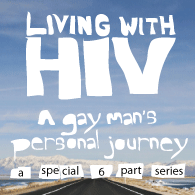Getting support when you have a major illness is always important for a person. It is more so for HIV-positive people, because of the stigma attached to the disease. It's not easy for people who do not have the disease to understand what a person infected with HIV goes through. It is for this reason that peer support can help a newly-diagnosed person get over the initial challenges of living with HIV.

When I finally agreed to meet other HIV-positive people, it was with a mixture of apprehension and excitement. HIV is such an isolating disease and the very idea that I would be connecting with other positive people made me feel not so alone any more. There were so many questions I wanted to ask, experiences I wanted to share.
On meeting the group, I realised one thing - even though we all had the same disease, we were all very different. The group was like a microcosm of Singapore society - there were Chinese-speaking uncles, a Malay woman, blue-collared ah bengs, professionals but somehow we managed to get along and share our experiences with each other. We were all in the same boat and there was a bond we shared and there was real concern for each other and each other's health condition.
There was the real danger of getting an Opportunistic Infection as treatment was still not available then, and people's health could deteriorate fast because of this. There were frequent hospital visits made, and many died along the way those were grim times.
As infection rates climbed in Singapore, so too did the number of patients. By the mid-1990s, there were enough gay positives who felt they should start their own group. Paddy Chew mooted the idea, along with a few others, as it was felt they wanted to more effectively connect with members. The gay mindset was also quite different from that of straight men and we could not openly talk about sexuality in a mixed setting.
So a gay support group for positive men was set up. We even included a transgender and a handful of women because the women numbered too few to have their own group and they also felt safer with us gay men. By then, medications became available, and members of the support group would share their experiences about taking the meds. There was still anger and frustration as not everyone could afford the medication. It was tough; the ones who could afford it felt guilty, while the others who could not felt they were doomed to die early.
Thankfully, by the year 2000, generic medication was made available in Thailand. By then, many were going to Thailand to get the medication; and they would share information on getting these cheaper and more affordable medications.
Friendships were forged in the support group; and have endured till now. It is also heartening to note that many came out of their shells and became empowered enough to help newer members. I've since stopped going to meetings these past few years now; as the need for it has diminished. I have my own family for support, as well as a network of friends to share my thoughts with.
More recently, I've also been able to contact other HIV-positive people through social network groups. The anonymity of the Internet has empowered HIV-positive people to come out in cyberspace. And it's a fairly safe space for them; I've actually chatted with a few and even met some.
So what can you do for a friend you know is HIV-positive? Respect them. I've had a few friends who have blabbed about my status to others as if it was a juicy piece of gossip. Needless to say, they've since been discarded. Too many times I've seen the confidentiality of the status of other HIV-positive people being broken.
The other one is acceptance. It's good to let them know you still accept them for who they are. But only if you mean it. I've had to deal with so-called friends who tell me they don't want to know about my status. Clearly, they have their own personal issues to deal with; and are not ready to support you. Again, I've cut ties with these sorts of people. It's enough to deal with the disease; I don't need an added burden.
Getting HIV, in a way, was good for me in that it helped me realise who were truly supportive of me, who were my real friends. Once you realise your life is on the line, you begin to see things clearer. People also tend to show their true colours when the chips are down. So I've since edited my social circle; and have been the healthier for it. It has allowed me to move forward with my own life. So yes - to those readers who are thinking "get over it" - I have. I know that being HIV-positive is just a part of who I am. My only hope with writing this series of articles is that people can re-look at their attitudes towards HIV. And for those who haven't even thought about it - start thinking.
